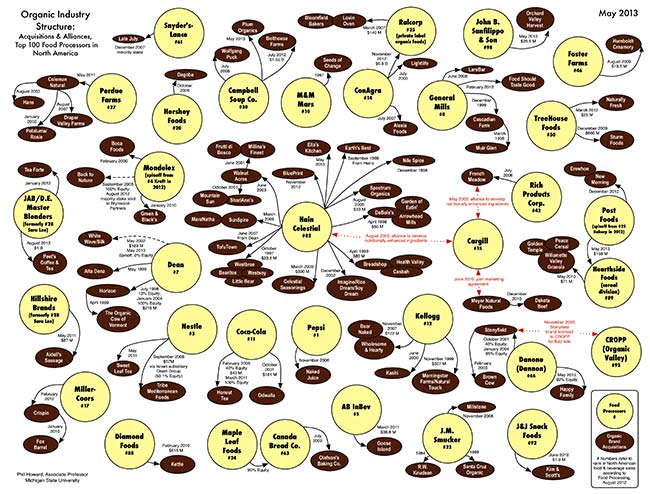Who Owns Organic Brands And Why You Should Care?
 Beth Hoffman - Contributor - Forbes - writes about the changing food system.
Beth Hoffman - Contributor - Forbes - writes about the changing food system.
The average American supermarket carries more than 38,718 products. Which means we have tons of choices, right?
Actually much of the yogurt and cereal, jams and chips are owned by very few companies. Even most of the organic brands lining the shelves of your local supermarket or natural foods store are no longer independently owned.
Popular brands, like Boca Burgers (owned by Mondelez, formerly known as Kraft) or Kashi (owned by Kellogg) were actually acquired years ago (both in 2000). Now other seemingly more local or small scale brands like Peet’s Coffee (now owned by JAB) or Coleman Natural (purchased by Perdue) have also recently been bought by large multinational companies in a new round of mergers and acquisitions in the industry.
But the question really is – so what? Why does it matter if Peet’s Coffee is no longer independently owned? Isn’t Brown Cow or Stonyfield yogurt (both now owned by Dannon) the same brand regardless of who owns it?

Frequently the acquisition of an organic brand by a larger company often means the watering down of a company’s standards, says Dr. Philip H Howard of Michigan State University.
“It’s very common that when an organic food brand is acquired, that the new parent corporation reduces its commitment to organic ingredients and seeks out cheaper substitutes,” writes Howard via email. “Examples include Odwalla after it was acquired by Coca-Cola, Silk Soymilk after it was acquired by Dean, and Peace Cereal after it was acquired by Hearthside Foods (now Post Foods). Consumers have to be vigilant about scanning the ingredient lists as a result.”
Checking the fine print on packaging, says Howard, can help consumers assess how many of the ingredients remain organic even after a company take over. Silk Soymilk, for example, began to use conventional soybeans instead of organic after it was taken over by Dean Foods without changing the packaging, although it did remove the “organic” label on cartons. [As is noted in the graphic, Silk more recently spun off to form the independent label White Wave and now offers a Non-GMO certified line of organic products].
Additionally, Howard adds, profits made from organic food purchases may be used in ways consumers would not support.
“One example is the recent vote on labeling genetically engineered foods in California [Proposition 37],” writes Howard. “Transnational corporations with stealth ownership of many organic food brands donated money to stop this effort, which is contrary to the views of the vast majority of all consumers (not just organic consumers).” Coca-cola (owner of Honest Tea and Odwalla), Pepsi-Co (Naked Juice), and General Mills (owner of Lara Bar and Food Should Taste Good) each contributed more than a million dollars to oppose Proposition 37.
To see how the industry has merged and consolidated over time - check out this interactive graphic by Dr. Philip H Howard of Michigan State University


